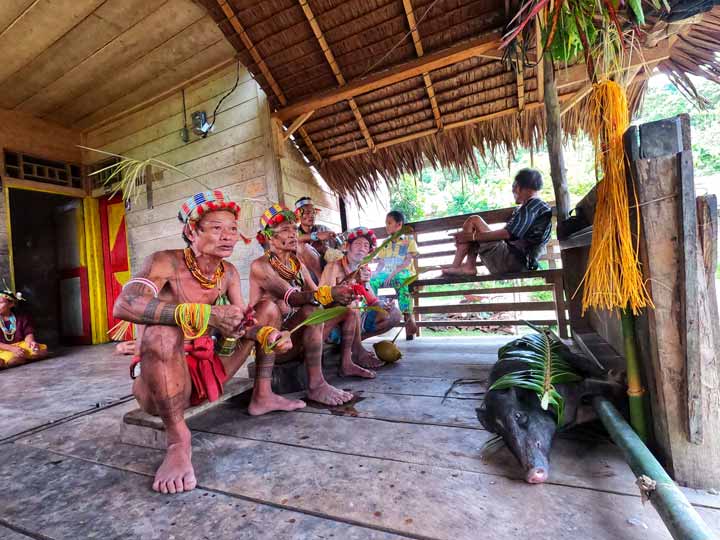Indigenous People
and Food Insecurity
in an Epoch of
Ecological Crises
More than 370 million indigenous peoples worldwide living in richly biodiverse yet fragile ecosystems—mainly forests and coastal zones—have suffered the impact of climate change.
This project studies indigenous foodways and food insecurity as a lived, physical and sensory experience imbued with contested moral, political, and affective significance for those subjected to deleterious effects. I call the study “Beyond Insecurity” (hereafter the BI). The BI aims to conceptualise food insecurity as a material, moral, affective, and symbolic experience. BI combines empirical and discursive analyses to stimulate a critical and mutually productive dialogue between the lived experience of insecurity, the indigenous perspective, and the established concept and measurement of food insecurity.
BI concept employs the empirical examination of the status of indigenous food security. It evaluates all four recognised components of food security—food availability, access, utilisation and stability—at household levels and how CC has affected them. Then, it investigates how CC affects how people produce, process, consume, and distribute food.
The BI concept also evaluates the empirical findings on food security, the changing of indigenous foodways in the moral, political, and ontological senses, and how indigenous peoples construct their identity and environment. It examines how food insecurity is shaped not merely by food access and availability but also by what kind of food, who produced it, where it came from, and how they consume it (see Chao 2021).
Lastly, the BI concept attends to the political aspect of foodways. Scholars point to the inadequate understanding and technocratic intervention of mainstream climate change to generate new technocratically driven ecomodernist solutions (such as promoting intensive farming, large-scale food production, and employment outside agriculture), reiterating the troubling argument that food scarcity is tied to the imbalance of power relations. This point requires a multi-site and interdisciplinary tradition of scholarship that understands the links between knowledge, power, position, and the reorganisation of food materials and their impacts on nature and people.
Approaches

Approaches: Food Anthropology, Environmental Humanities, and Political Ecology
BI draws three significant approaches: food anthropology, environmental humanities, and political ecology. Food anthropology offers mixed methodologies for examining food’s material and symbolic importance. The primary method of participant observation generates a thick description of indigenous foodways, which is the basis of analysis of food insecurity from emic perspectives. It also constitutes a nutritional study that employs quantitative measurements of nutritional intake and calorific expenditure with the physical and bodily experience that informs the analysis of food insecurity from the etic perspective. With these mixed methodologies, food anthropology shows that food insecurity and vernacular terms like hunger and hunger are not presumed universal phenomena but culturally bounded, intersubjective, and lived.
Site : Indonesia

The country is home to one of the most diverse indigenous peoples and the most biodiverse and resource-rich countries globally. With its extensive coastline and millions of indigenous peoples on low-lying land just above sea level, Indonesia is most vulnerable to rising sea levels and other weather-related disasters like forest and land fires, landslides, storms, and drought. One of the major concerns for Indonesia is that CC has already affected evaporation, precipitation, and run-off soil moisture and water, affecting agriculture and food security. The impact of CC is particularly significant to the country’s indigenous peoples as they live mainly in the rich but fragile ecosystem and have historically experienced marginalisation, criminalisation and violence associated with resource extraction. The national report on food security status (DKP 2015) firmly states that indigenous peoples comprise 70% of the population experiencing food insecurity.
ABOUT ME
I am an anthropologist with a long-term interest in studying human-environment relations. Based on fieldwork conducted in the outer island of Indonesia over the last five teen years, I have studied the politics and poetics of nature conservation, resource extraction in the frontier zone, indigeneity as cultural politics, and how producing and sharing food generates communal values. My current research interests revolve around climate change and indigenous foodways, multi-species ethnography, and the peculiarity of the Anthropocene.
Specifically, I am researching two research topics: the
relationship between climate change and indigenous people’s foodways and the relationship between extraction and animism in the Anthropocene. Beyond academics, I participated in the engagement of ethnographic methodologies and endeavours with conservation and development projects, believing that anthropology can be both a constructive and critical ally for any social intervention.




